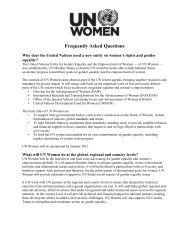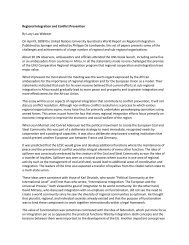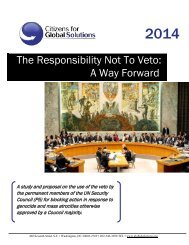Minerva, Fall 2011 - Citizens for Global Solutions
Minerva, Fall 2011 - Citizens for Global Solutions
Minerva, Fall 2011 - Citizens for Global Solutions
- No tags were found...
Create successful ePaper yourself
Turn your PDF publications into a flip-book with our unique Google optimized e-Paper software.
narrative. Especially <strong>for</strong> franchises withlong histories, … a big part of what hooksfans—what pushes a casual fan deeperinto the spectrum—is the multitude ofstory lines that can be seen in longstandingrivalries, the career arcs of players,and of course, individual games.” And“narrative has a self-rein<strong>for</strong>cing property”:the more familiar one is with teamhistory and the more deeply one knowsa team, the better “you’re able to keeptrack of multiple story lines at once. …”This gives people a sustaining sense ofprogress (not mere static success or depressinglydistant promise of it). Whileaccommodating fans to unpredictability,it offers, notes Neyfakh, an enlivening hitof what sports experts call “eustress” —“the addictive combination of euphoriaand stress that grips fans”, with rewardsdelivered at irregular intervals.In this context, Adam Sternbergh 27 eventouts “the epic sports collapse” that “is tobe treasured, even more so than the improbablevictory. It’s more rare, and there<strong>for</strong>emore precious. And it reaffirms theessence of why we root <strong>for</strong> a team in thefirst place. … It’s crushing, maddening,unfathomable — and yet it means nothing.… The epic collapse … is an opportunityto confront an event that’s bewildering inits unlikelihood and ruinous in its effect,yet to also walk away entirely unscarred.It matters, deeply, and yet it doesn’t matterat all. … At a time when much moredire collapses — financial, emotional,geopolitical, familial — are a frequentoccurrence or at least a consistent threat,the opportunity to experience and surviveone, however trivial or nonexistent therepercussions, is something to be valued,not lamented. It’s the one time you shouldreally be grateful <strong>for</strong> deciding to be a fan.… There is one demonstrable value to beinga sports fan. It allows you to feel realemotional investment in something thathas no actual real-world consequences.In any other contest (presidential campaigns,<strong>for</strong> example), the outcome can beexhilarating or dispiriting to its followersand, by the way, when we wake up thenext day, the course of history has beenchanged.”There are other risks, of course. 28 Unrulyfanatics abound. Weak characters whocan’t handle a heady mix of instant anddelayed gratifications can resort to hooliganism.More commonly, carelesslypoor fan manners are displayed. DanielE. Doyle Jr., who studies sportsmanship,cautions: “You have people who, emboldenedby the cover of the crowd, are ableto say anything and do anything withoutconsequences”, 29 as in other venues suchas the Internet.Corruption by peer pressure and manipulationsof fanhood to distract people fromthoughtfully asserting the responsibilitiesof citizenship are not the only factors tobe considered when gauging or endeavoringto engage public opinion, however.When it’s not going berserk, fandomrecognizes the precariousness of <strong>for</strong>tuneand security, the illusion of invincibility,the stimulation (though sometimes to excess)of opposition. Segments of a sportscrowd with different allegiances are similarlyengrossed in a partially meshed narrativeand equally vigilant <strong>for</strong> signs ofunfairness (though interpretations differ,of course), with acceptance (howevergrudging at times) of rules and referees.Flipping to the less trivial political protestversion of these tendencies, the “OccupyMovement” (<strong>for</strong> example) seems toinclude a mix of descriptive accounts ofstructural crises and angry objections togaming the system.So it may be possible to move beyondspasms of cheerleading to tap into certainfan capacities — particularly love ofnarrative 30 and fairness 31 — in ways thatrender tensions productive or rehabilitative,conducive to involvement in worldaffairs, while avoiding either paralyzingourselves with futile desire <strong>for</strong> total comityor destroying ourselves with enmity.Owning common heritage and destiny, weneed not anticipate perfectly integratedglobal brain circuitry or revert to the superiorcooperative finesse of slime moldcells. With today’s multiplicity of megaphones,global citizens — who realizethat we don’t have to think alike or loveeveryone to recognize that “we’re one!”— can lead and heed sustained summonsin support of the Commonweal: a humanehuman future.“2-4-6-8 — CONGLOBATE!”6 • <strong>Minerva</strong> #39 • November <strong>2011</strong>ENDNOTES:1 - University of Chicago football cheer(late 60s):Themistocles, ThucydidesThe Peloponnesian WarX-squared, y-squaredH2SO4Who <strong>for</strong>? What <strong>for</strong>?Who we gonna yell <strong>for</strong>?Go Maroons!2 - More neutrally, Adam Gopnik comments:“There’s no pattern in history tocompare us to, because nothing like usever happened be<strong>for</strong>e. The lessons of declinismare manifold, but the central oneis that obsessively fretting about possibledecline can be a good way to produce it.… Whatever happens next, short term orlong, is likely to be more affected by accidentand by invention — and by newideas — than any trend now in sight. …Declinism is a bad idea, because no onecan have any notion of what will happennext. Yet the idea of our decline is emotionallymagnetic, because life is a longslide down, and the plateau just passedis easier to love than the one comingup” (“Decline, <strong>Fall</strong>, Rinse, Repeat — IsAmerica Going Down?”, The New Yorker,12 September <strong>2011</strong>).Aside from the death link, Gopnik is notsurprised that many voters refuse to act to“maximize future utility” and even preferto ignore their own interests: “In the longstory of civilization, the moments whenimproving your lot beats out annoyingyour neighbor are vanishingly rare.”3 - James Carroll, Boston Globe, 16 May<strong>2011</strong>4 - Tariq Ali, British/Pakistani politicalcommentator and editor of the New LeftReview, “America’s Selective Vigilantism”,The Guardian, 7 September <strong>2011</strong>):“‘Sovereign is he who decides on the exception,’Carl Schmitt wrote in differenttimes almost a century ago, when Europeanempires and armies dominated mostcontinents and the United States was baskingbeneath an isolationist sun. What theconservative theorist meant by ‘exception’was a state of emergency, necessitated byserious economic or political cataclysms,that required a suspension of the constitution,internal repression and war abroad.”













